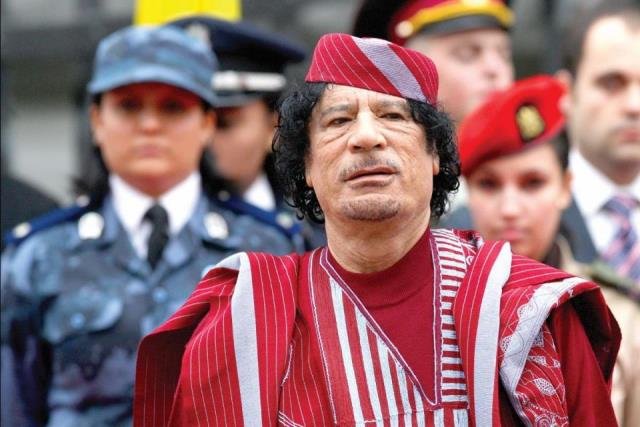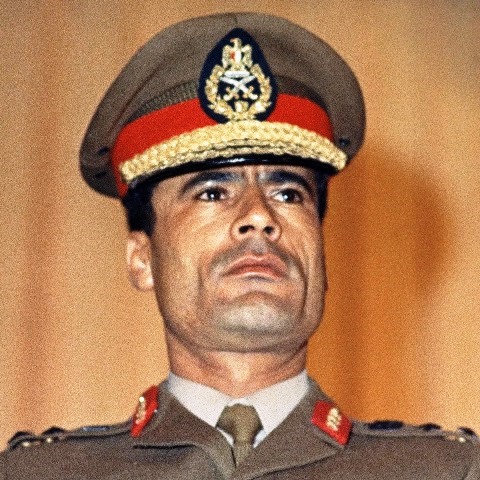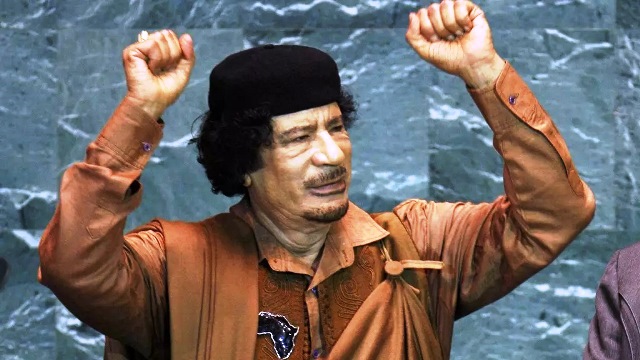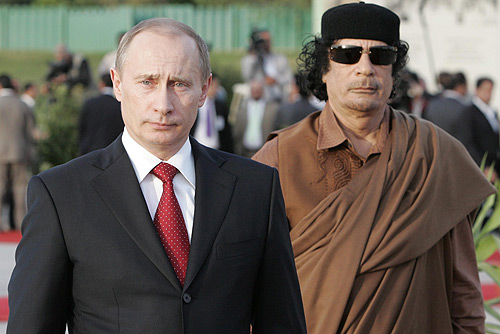History is almost always doctored. As it is passed down from generation to generation, accuracy gets lost on the way. There are varying perceptions depending on who is telling the story and how the listener or reader receives it. Sometimes, it is watered down intentionally. We saw it in how the United States erased native Americans from history. Another example is how Argentina erased the black community from its history. There are many other examples, such as the story of Muammar Gaddafi.
The former ruler’s life and actions provoke controversy. Although Gaddafi improved the lives of his people, he reportedly denied them other human rights. How ironic. This is a bit of a bittersweet story. Muammar Gaddafi’s life is still being debated to date. Was he a good guy or a bad guy? Let’s find out. But first, who was Muammar Gaddafi?

Who Was Muammar Gaddafi?
Muammar Gaddafi, also known as Colonel Gaddafi, was the leader of Libya from 1969 until he died in 2011. During his 42-year rule, Gaddafi implemented several controversial policies and actions that have led some to view him as a hero, while others consider him a villain.
Gaddafi came to power in 1969 in a bloodless coup, overthrowing the Libyan monarchy and establishing a socialist government. He quickly set about implementing some social and economic reforms, including the creation of a free education and healthcare system and the distribution of wealth among the population through the creation of a welfare state. These reforms were popular with the Libyan people and helped to bring prosperity to the country.
Muammar Gaddafi was the leader of Libya from 1969 until he died in 2011. He was a controversial figure, and his legacy is still debated today. Was he a hero or a villain?
Despite his humble origins, Gaddafi was a brilliant student. He attended the University of Benghazi, where he studied mathematics and engineering.
In 1969, at 27, Gaddafi led a military coup that toppled the Libyan monarchy. He abolished the constitution and proclaimed himself “Leader of the Revolution.” Gaddafi ruled Libya with an iron fist, and his regime was marked by human rights abuses and a lack of democracy.

How Gaddafi Grew Up
Muammar Mohammed Abu Minyar al-Gaddafi was born in the deserts of Tripolitania. Western Libya, near Qasr Abu Hadi, a rural area outside the town of Sirte. His ancestors belonged to the Qadhadhfa, a small and somewhat insignificant Arab tribe.
The family, like other nomadic Bedouin tribes nowadays, was illiterate and did not keep birth records. Many biographers have claimed June 7th as his birthday. However, his exact birthday is unknown, with sources putting it in 1942 or the spring of 1943. Also, his biographers, David Blundy and Andrew Lycett, have highlighted that it could have been before 1940.
Innovative Tech Solutions, Tailored for You
Our leading tech firm crafts custom software, web & mobile apps, designed with your unique needs in mind. Elevate your business with cutting-edge solutions no one else can offer.
Start NowGaddafi is the only son of his parents, and he has three older sisters. Gaddafi’s Bedouin background influenced his personal tastes for the rest of his life; he preferred the desert to the city and would always, during his life, retreat there to think.
Gaddafi was aware of European colonial powers’ participation in Libya from childhood. Italy colonized his country, and the North African Campaign of World War II saw warfare between Italian and British soldiers. According to later reports, Gaddafi’s paternal grandfather, Abdessalam Bouminyar, was murdered by the Italian Army during the 1911 invasion.
British and French soldiers controlled Libya at the end of WWII in 1945. Then, Britain and France considered dividing the country between their empires. But, the United Nations (UN) General Assembly decided that the country should be granted political independence, and in 1951, the United Kingdom of Libya was established. A federal state led by a pro-Western monarch, Idris, who banned political parties and centralized power in his own hands.

Muammar Gaddafi and His Education
Gaddafi’s first education was religious, provided by a local Islamic tutor. He then moved to nearby Sirte to attend elementary school, where he completed six classes in four years. Although education was not free in Libya, his father believed it would benefit his son significantly. Gaddafi slept at a mosque during the week and went 20 miles (32 kilometers) to see his parents on weekends. He was bullied at school for being a Bedouin. Still, he was proud of his heritage and encouraged other Bedouin children to be proud as well.
From Sirte, he and his family relocated to the market town of Sabha in Fezzan in south-central Libya. There, his father worked as a caretaker for a tribal leader while Gaddafi completed secondary school, something neither of his parents had done. Gaddafi was well-liked at this school, and some of his classmates became important figures in his administration, including his best friend, Abdul Salam Jalloud.
Gaddafi’s Time in the Military
Gaddafi briefly studied History at the University of Libya in Benghazi before dropping out to join the military. Despite his police record, he enrolled in the Royal Military Academy in Benghazi in 1963 with a group of Misrata friends.
The military forces provided the sole possibility for upward social mobility for disadvantaged Libyans. And Gaddafi saw them as a possible tool for political reform. Libya’s armed forces were taught by the British military under Idris. This enraged Gaddafi, who saw the British as imperialists. As a result, he refused to learn English and was rude to British officers, eventually failing his tests.
British trainers denounced him for insubordination and aggressive behavior, citing their suspicions that he was involved in the assassination of the military academy’s chief in 1963. The reports were ignored, and Gaddafi easily advanced through the course.
In 1964, Gaddafi formed the Central Committee of the Free Officers Movement. This was a revolutionary group named after Nasser’s Egyptian predecessor, with a handful of dedicated comrades. They convened in secret, led by Gaddafi, and formed a clandestine cell system, pooling their paychecks into a single budget.
In April 1966, he was assigned to the United Kingdom for additional training, where he completed an English-language course in Beaconsfield, Buckinghamshire, an Army Air Corps signal instructors course in Bovington Camp, Dorset, and an infantry signal instructors course in Hythe, Kent for nine months.
Gaddafi despised England, alleging that British Army personnel had racially insulted him and that he was having difficulty adjusting to British culture. To establish his Arab identity in London, he went about Piccadilly wearing traditional Libyan robes. He later said that while he flew to England, he returned home “more confident and proud of our values, ideals, and social character.”

Was Muammar Gaddafi a Hero or a Villain?
It’s a complex question with no easy answer. On the one hand, Gaddafi is often praised for his significant improvements in Libya during his rule. He implemented several social and economic reforms, including creating a free education and healthcare system and distributing wealth among the population through a welfare state. These reforms were popular with the Libyan people and helped to bring prosperity to the country.
However, Gaddafi’s rule was also marked by authoritarianism and repression. He suppressed dissent and opposition and used violence and intimidation to maintain his grip on power. He was also accused of committing human rights abuses, including the torture and killing of political prisoners. His foreign policy was also controversial, with accusations of supporting terrorist organizations and being involved in international conflicts.
Despite these controversies, Gaddafi maintained his grip on power for over four decades. He was able to do this through a combination of clever propaganda and the use of force. He also relied on a network of loyal supporters and allies and was able to divide and conquer his opponents.
In Libya, many see Muammar Gaddafi as a hero, especially since the country has struggled since he was killed. The Western nations would argue otherwise and call him a dictator who oppressed his people. This makes you wonder the extent of the United States’ contribution to Muammar Gaddafi’s death.
The United States’ Contribution to Gaddafi’s Death
Recently, some emails of Hilary Clinton were leaked which revealed a connection between the ruler’s death and the United States.
In 2011, Hilary Clinton as the US Secretary of State joked with a reporter upon hearing of Gaddafi’s death. “We came, we saw, he died,” she said.
Ultimately, it’s up to each individual to decide whether they view Gaddafi as a hero or a villain. Some may see him as a champion of the people who brought prosperity and social reform to Libya. Others may see him as a dictator who oppressed his people and engaged in questionable and dangerous activities abroad.
Seamless API Connectivity for Next-Level Integration
Unlock limitless possibilities by connecting your systems with a custom API built to perform flawlessly. Stand apart with our solutions that others simply can’t offer.
Get StartedIt’s important to consider all the evidence and arguments when judging his legacy. Because Muammar Gaddafi is a complex and controversial figure, opinions on his legacy vary widely. Regardless of how one views Gaddafi, it’s clear that his rule had a significant impact on Libya and the world, and his death marked the end of an era in the country’s history.
Muammar Gaddafi’s Death
In 2011, a popular uprising against Gaddafi’s rule began, leading to a civil war and the eventual collapse of his regime. Gaddafi was captured and killed by rebel forces, ending his rule in Libya.
Following his loss in the civil war, Gaddafi’s governance system was dissolved and replaced by the NTC’s interim government, which recognized labor unions and press freedom. Elections were held in July 2012 to form a new General National Congress (GNC), which took over control from the NTC in August. The GNC elected Mohammed Magariaf as president and Mustafa A. G. Abushagur as Prime Minister. When Abushagur could not win congressional approval, the GNC appointed Ali Zeidan to the role.
Before you go…
Hey, thank you for reading this blog to the end. I hope it was helpful. Let me tell you a little bit about Nicholas Idoko Technologies. We help businesses and companies build an online presence by developing web, mobile, desktop, and blockchain applications.
We also help aspiring software developers and programmers learn the skills they need to have a successful career. Take your first step to becoming a programming boss by joining our Learn To Code academy today!
Be sure to contact us if you need more information or have any questions! We are readily available.











